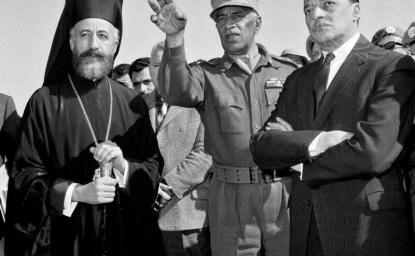East German Spy Files Back Under Lock and Key
REUTERS (BERLIN) -- East Germany's secret police archives, forced open a decade ago by hunger-striking protests, have slammed shut, ending a post-cold war era of openness and possibly protecting those who suppressed a nation for 40 years.
The meticulous note-taking of the east German Secret Police, or Stasi,
has provided historians and journalists with an invaluable insight
into the workings of a dictatorship that spent $1.6 billion a year
securing its stranglehold.
The archives have been instrumental in trying the leaders of feared
police operations, ending the careers of politicians tainted with the
Stasi brush and breaking up friendships and marriages as former East
German citizens discovered their trusted allies or spouses had
informed on them.
Many of the 2.4 million people tracked by the Stasi, most just normal
former East German citizens, have had access to their own files. The
Gauck Agency which oversees the archives has also allowed historians
and journalists to peer into the records of so-called "prominent"
people of historical interest.
That open policy may be coming to an end after former Chancellor
Helmut Kohl won a court case to prevent Gauck releasing parts of his
6,000-page dossier.
The decision was based on the view that the 72-year-old Kohl, whose
telephones were tapped, was a victim of the Stasi regime, and was
legally entitled to withhold his file.
"It's a real setback. Many documents are now simply not available...we
reckon that about 90 percent of inquiries from researchers and the
media will be affected. The documents have been rendered unusable,"
said Marianne Birthler, head of the archives.
People will still be able to view their own files, but researchers
will now need permission to view the files of others which might be
difficult, if not impossible, to obtain. The ruling could also shield
the guilty.
"A former communist party official or a judge could claim the status
of a victim and be protected. That's our problem now," Birthler said
in an interview with a small group of journalists.
-------------------------------------------------- ----------
--- Historians Worried ---
The Stasi tailed and tracked political opponents, both actual and
perceived, Western politicians and many of East Germany's 16 million
citizens. the archive's papers, if lined up flat, would stretch for
180 kilometres (112 miles).
The Stasi's job was to prop up a government with a siege-like
mentality built on cold war paranoia which preached equality, but
dealt out favours and privileges.
"The Stasi was not, as some say, the cancer of the East Germany, but
the heart. A dictatorship cannot function without a secret police,"
Birthler said.
The reinforced concrete fortress in central Berlin which housed the
Stasi headquarters has two entrances -- the main one on display at the
front and a red-marble staircase at the back, where chauffeur-driven
limousines brought in the force's top brass.
About 250,000 people were imprisoned by the Stasi for political
reasons. Some were kept in solitary confinement and there was little
openness about those in detention. Vehicles transporting prisoners in
cramped conditions could, for example, be painted to look like bakers'
delivery vans.
"How were millions of people suppressed? Why could people not protest?
You can learn how this dictatorship and dictatorships in general work.
It's the first time that such an amount of documents have been saved
from destruction. We need to keep them for future generations,"
Birthler said.
--- Historians Agree---
Christian Ostermann, head of the U.S.-based cold war international
history project, said he was concerned about the possible restrictions
on access to the files and the precedent it might set for other former
communist bloc countries.
"The court finding might have global repercussions in particular
because Germany's handling of the Stasi files has widely been viewed
as a model," Ostermann said.
"The decision also undermines the openness' legacy of the Kohl
government which implemented the opening of the files in the 1990s.
It's highly regrettable."
Bernd Schaefer, research fellow at the German historical institute in
Washington who has studied links between the Stasi and the Catholic
church, fears that many files, now with most names blackened out,
would lose all meaning.
"We've been able to see the operations of the Stasi and the people
responsible and the extent of their espionage in the west... what was
important for the people was to know who did what, not so much for
revenge, but to destroy many myths," he said.
In mid-March, Czech President Vaclav Havel signed a law to broaden
public access to its communist-era files.
--------------------------------------------------------------------------------

Cold War International History Project
The Cold War International History Project supports the full and prompt release of historical materials by governments on all sides of the Cold War. Read more




